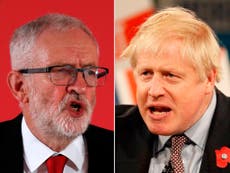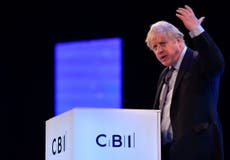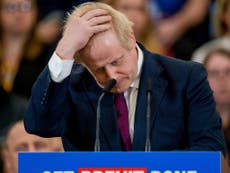Boris Johnson’s Brexit promises mean nothing – businesses mustn’t be fooled
The prime minister, Jeremy Corbyn and Jo Swinson are all looking to win over the CBI and its members. But the major parties all have weaknesses that could leave businesses cold

Beware politicians who come bearing gifts. We’ve already had the bidding war on public spending. Now the parties have displayed their wares to the business community.
Our party leaders always troop along to the Confederation of British Industry (CBI) annual conference in November, making promises to listen and work together. For the first time, the conference falls in the middle of an election campaign, so the speeches by Boris Johnson, Jeremy Corbyn and Jo Swinson were also aimed at a wider audience.
Both Johnson and Corbyn started their matches 0-2 down. The prime minister’s ill-judged “f*** business” remark – over its fears that Brexit would cost jobs and investment – left such a stain that not offering something in his speech would have been ill-advised. Santa Boris delivered a tax cut of up to £1,000 for small companies, through lower national insurance contributions. Surprisingly, he postponed a further planned cut in corporation tax from 19 to 17 per cent next April, to pump £6bn into public services like the NHS – a sign of where his priorities lie at this election.
Inevitably, Johnson offered yet another review of business rates, which contribute to the severe problems on our high streets. A polite, sceptical groan behind cupped hands for that. The CBI pulled its punches on immigration today, despite its concerns that Tory plans to allow in “the brightest and best” will limit the low-skilled migration the economy needs.
The timing of the CBI event was not good for Corbyn. John McDonnell, the shadow chancellor, has had some success in building bridges with the City of London in his “tea offensive” (he doesn’t accept food). But business leaders are angry that Labour broke its “no more surprises” rule by announcing the part-nationalisation of BT as part of its free broadband policy. McDonnell had previously promised that BT was off limits. As a result, Labour has a trust problem with business, which wonders whether there will be any more nasty surprises.
The prime minister promised “certainty” on Brexit if he secured an overall majority – a word business likes, but something which has been in short supply since the 2016 referendum.
Swinson offered a different kind of certainty – a stop to Brexit, through her party’s controversial policy to revoke Article 50. Portraying the Liberal Democrats as “the natural party of business”, she argued that “any form of Brexit, whether it’s hard or soft, blue or red, will be bad for jobs, business, and our public services”. Many in her audience would privately agree; they regard the policies of the Tories and Labour as at the extreme end of the spectrum. However, they know the Lib Dems have a credibility problem: revoking Article 50 could happen only if the party forms the next government – but its opinion poll ratings appear stuck at about 16 per cent.
Corbyn told the CBI it was “nonsense” to say he is “anti-business”. He dangled the carrot of an unprecedented investment programme that would bring growth to every part of the UK, though some business people worry about the £400bn of borrowing that would entail. The Labour leader had to defend his party’s plans to raise corporation tax to 26 per cent; increase income tax for the top five per cent of earners and phase in a four-day working week.
Despite his audience’s concerns on such matters, some business leaders quietly prefer Labour’s approach to Brexit to the Tories’. Labour would ensure the “frictionless trade” the CBI wants; Johnson cannot guarantee that because he wants to diverge from EU regulations. Corbyn offered either a soft Brexit deal he would negotiate, with a customs union and single market access, or remaining in the EU – the two options in the referendum he would hold within six months to “bring an end to this endless debate”.
Johnson claimed Labour’s policy would mean more “dither and delay”, while he would “give business complete stability and certainty”. He was again being rather economical with the truth. True, many business people welcome his Brexit agreement as much better than the damaging no-deal departure he had flirted with. But the “certainty” provided by leaving the EU in January on Johnson’s timetable would be very short-lived. He told the CBI he saw “absolutely no reason why” a long-term trade deal with the EU could not be struck by December 2020, when the standstill transitional period would end. Officials in Whitehall and Brussels believe this is wildly optimistic. “Zero chance; it would take at least three years,” one EU diplomat told me.
The problem is that Johnson, in an attempt to persuade Nigel Farage to stand down his Brexit Party candidates, has promised not to extend the transitional period. So another no-deal cliff edge looms in December 2020, bringing yet more of the uncertainty and instability that casts a cloud over business, investment and jobs. Brexit doesn’t mean Brexit; it means Groundhog Day.






Join our commenting forum
Join thought-provoking conversations, follow other Independent readers and see their replies